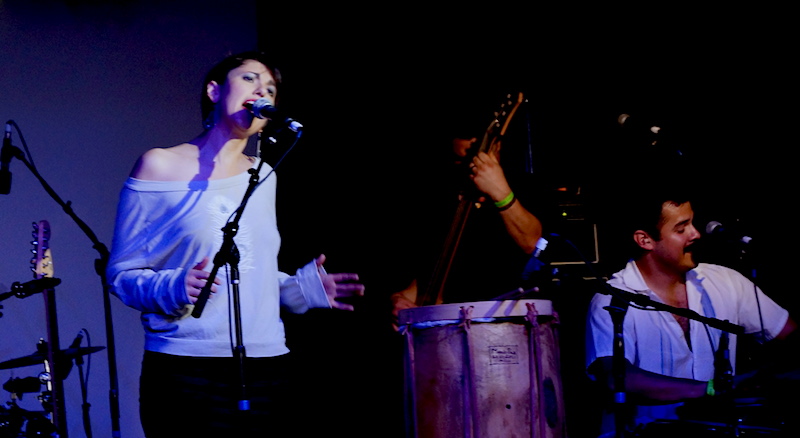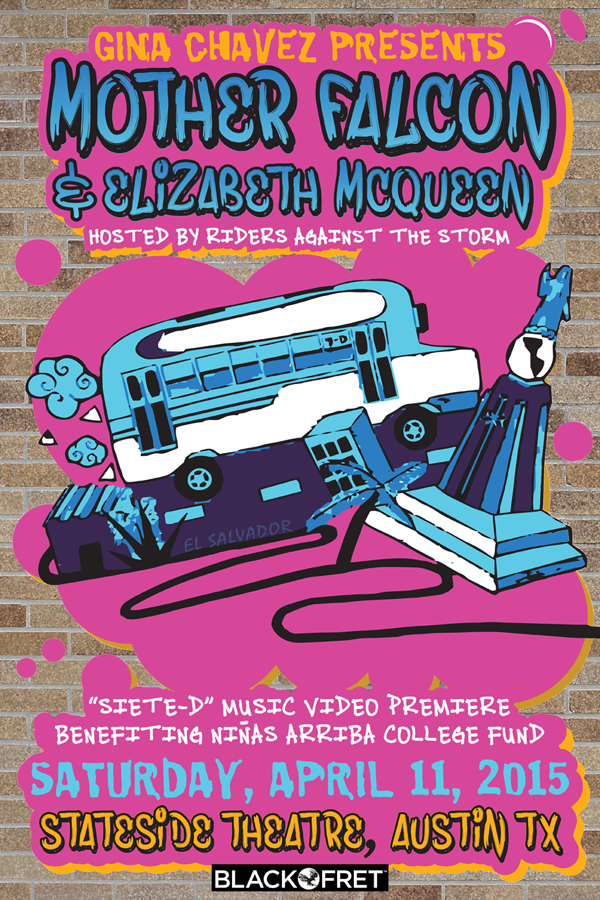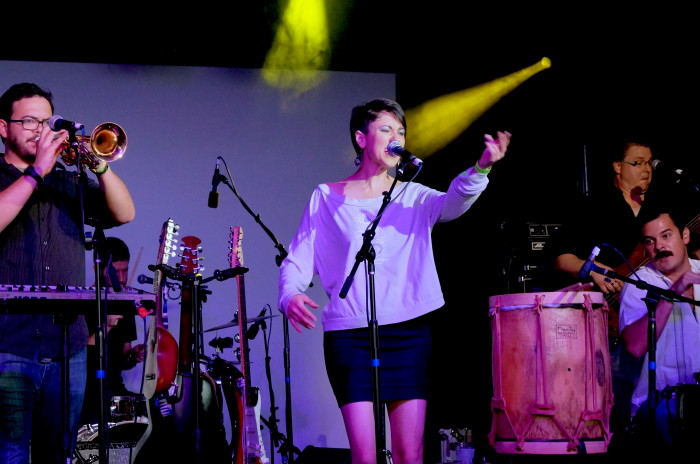While it may seem like Austin songstress Gina Chavez already has an impressive track record in music, the truth is, she’s only getting started. In just one year, Gina Chavez has accomplished more than most: she’s released a compelling and defining album titled Up.Rooted, in which she explores her Latin roots, she’s been featured on NPR Music, and she was crowned Musician of the Year at the Austin Music Awards while also racking up Album of the Year, Song of the Year, Latin band of the year and the AMP Esme Barrera Award for Music Activism and Education. To add to her growing list of wow-moments, Austin mayor, Steve Adler, just recently declared April 2nd “Gina Chavez Day.” But even with so much success in the past and surely more to come, this Texas native knows her work is not yet done and is inspired to do more than stun crowds with her effortless talent, beautiful voice, and guitar. To Chavez, community matters and she can thank her Catholic upbringing for that.

via ginachavez.com
Aside from the music, Gina Chavez has focused her attention on not only uplifting young women in struggling communities, but also sending them to school to continue their education through Niñas Arriba, a college fund founded by Chavez and her partner to send young girls in communities of El Salvador to college.
Now, she’s preparing for the benefit concert of a lifetime, featuring Austin hip-hop husband and wife duo Riders Against the Storm, orchestral rock band Mother Falcon and a video premiere from the rising star herself for her high energy, community-inspired single Siete D. Gina Chavez sat with us to talk about her start in music, how she’s been influenced by the community, her faith and what the Ninas Arriba college fund is all about.
When and how did you first get your start in music?
It was actually when I couldn’t get into art class at Lamar Middle School. My mom said to me, “Gina, you’ve always loved singing, why don’t you try choir?” And of course, this was during the pre-Glee years before choir was cool. So, I got into choir and quickly realized, I’m alright at this (laughs). Then, I picked up a guitar when I was 18. I had just gotten to UT and I saw a Tony Price show down at the Continental Club. She doesn’t play guitar, but I thought to myself, I want to do what she’s doing but I don’t want to have to wait for somebody to accompany me. So, I picked up a guitar and it was pretty natural. It all fell into place. Then, I tried to do cover songs, but I was too lazy to learn other people’s songs and I started writing my own (laughs). It was pretty natural for me to start writing too. That’s how I got my start.
Your music is so diverse – there’s a little pop, a little latin, folk and even rap. What’s your creative process like and what influences you to diversify your work?
A lot of times, if I listen to somebody’s album or I go to a show, they might have a really solid sound, but if they don’t catch my attention by doing something different then I think, okay, well they nailed that one thing pretty well. Now, at the same time, that is a lot easier to market because you fit into a box. I think for me, that’s actually been one of the challenges. For the longest time, before I really landed on Latin music, I remember having a very serious debate with myself. I loved Celtic music and I loved bluegrass and blues, but not straight up. I didn’t really know where to go.

Photo by Megz Tillman
The more I really dove into Latin music, the more I discovered this personal connection because it’s who I am and then the fans loved it. For instance, I would play at Mozart’s Coffee Shop where no one’s listening to you and you’re totally background music. But inevitably, the one song they would come up to me and talk about was the one spanish song off of my first record called Embrujo. They’d say, “Man, do you have anymore of that Flamenco stuff?” And it’s not Flamenco but it was the closest thing they could compare it to. So, the more that I dove into that, I found this nice synergy of what I love to do and what the fans really like too. It’s a fusion of [the band’s] influences and what’s happened is we’ve come up on a sound of our own.
There’s also a sense of culture and activism embedded in your music and you’re also active in the community outside of music – any particular life experiences that have shaped that activism and artistic passion?
I remember being in a high school youth group. We had a presenter talk to us about homelessness in Austin. We went on a 30-hour hunger strike and then made sandwiches while still fasting. We took them down to the homeless on the drag. I think that was one of the first experiences opening my eyes to other things going on in the community and the injustice of it. And I’m realizing that I’m extremely blessed and I’ve been very well-loved all my life. That’s not an experience that even half the people in the world have. I’ve always been very conscious of that inequity and also battling a lot of guilt over that. Why was I dealt such a great hand and so many people weren’t?
I was also involved in something called Just Faith about Catholic social teaching. It was a really intense, 6 month look at our world. We looked at things locally and we looked at things in our world. We learned about living in solidarity with people, which doesn’t mean, “Oh, poor homeless person,” and then you walk off. It’s the idea that you live with them, they are your brother and sister. Unfortunately, this is best kept secret of the Catholic church. But I really connect to those things in my faith. That’s a big reason why I’m still practicing Catholic, even though I’m a lesbian (laughs). I think there’s just something in me that gets it. I get that life sucks for a lot of people. There’s also a responsibility for us to do what we can to help each other and what better platform than a microphone. Now, at the same time, I try to ride the line between being a great musician and having an agenda. But the folk in me wants to have songs that have meaning. So I’ll entice people with rhythm and sound and once they really get into the music, they get to keep discovering these levels within the music. So, yes, we’ll make your hips move first, then we’ll make your heart move. I love that.I’ll entice people with rhythm and sound and once they really get into the music, they get to keep discovering these levels within the music. So, yes, we’ll make your hips move first, then we’ll make your heart move.
And who’s your favorite artist out right now?
Honestly, I am so excited about Stromae. Phenomenal. He writes as if he’s observing human interaction, like a documentarian or a journalist. He sings in French, with a pop/dance sound, but his lyrics are so hard hitting. The other thing that intrigues me is that every song is varied. He uses rhythms from Africa – he’s Rwandan and Belgian – his dad was killed in the Rwandan genocide, so he has a pretty rich story. He looks androgynous and does interesting things with male and female dress and acting on stage. He’s very socially intriguing.
You bring a lot of visibility to some underserved groups, especially as an LGBT woman. In what ways does that influence your music and impact your career?
I haven’t received backlash from coming out. I treated it gingerly because I’m Catholic and it’s just tough in certain circumstances. But I think more and more, I’ve been open about [my sexuality] and honestly, I’ve been really supported by all of my communities, even people at church. I remember there was this article that came out in Austin360’s Out & About. It just had a sentence or two about me and my partner and I had people come up to me in church and say, “Hey, I read that article. I’m so proud that you talked about that.” So, I don’t think I’ve been discriminated against in that regard, but at the same time, Jodi and I are coming up on nine years together and I’m going to have to put a ring on it soon [laughs]. Coming closer to the inequality that exists in our law, I think I’m going to start feeling it a little more in my heart, than just knowing it in my head. And it’ll be interesting to see how that comes out in my music.
Switching gears a little, can you tell me about your college fund Ninas Arriba and also your upcoming benefit?
In 2010, my partner Jodi and I spent 8 months in El Salvador. We lived in a gang-dominated part of San Salvador called Soyapango. We lived with Catholic nuns as part of a Catholic group called Vides, which is a really cool program. It was essentially like living on a compound.
 Most of our job was to be with the girls in need, in the internado, which is similar to a boarding school. There were 800 girls that went to the school and we taught English classes. 18 girls lived at the school, so they became like sisters to us. We dealt with all of their drama, we woke up super early in the morning with them to do prayers and chores. But at the end of the 8 months, we got to go back to our first world country and they had to stay there. It’s hard. It’s hard to leave knowing you got to go back to your comfortable life and these girls live where you may wake up one morning and twenty feet from your door is a chalk drawing of someone who was shot the night before.
Most of our job was to be with the girls in need, in the internado, which is similar to a boarding school. There were 800 girls that went to the school and we taught English classes. 18 girls lived at the school, so they became like sisters to us. We dealt with all of their drama, we woke up super early in the morning with them to do prayers and chores. But at the end of the 8 months, we got to go back to our first world country and they had to stay there. It’s hard. It’s hard to leave knowing you got to go back to your comfortable life and these girls live where you may wake up one morning and twenty feet from your door is a chalk drawing of someone who was shot the night before.
So, we had a conversation with a senior class that we taught. We asked who wanted to go to college and everyone raised their hand and then we asked who was going to college and every hand dropped. It’s just completely unaffordable for them. We had four girls who were seniors at the time, so we thought, what if we started a college fund to try to send them to school? Then we decided to raise money through benefit concerts. That’s how it all started. Today, we’re supporting four girls and two will graduate next year. We’ve raised about $25,000 in the past five years and through benefit concerts and individual giving. So, with this April benefit, anything over production costs goes straight to the girls.
I think in every community across the world, education is the key, especially for girls. There’s something about educating women, that because of the way they are, they can uplift their communities. So, these girls are like sisters to us and if the fund stops after the four graduate then so be it, but maybe we can continue and make it bigger and continue to help the girls in these communities.
What’s the backstory behind Siete D? It’s such a fun song, but there’s also a story behind it.
The first weekend in El Salvador, the volunteers we were replacing showed us the ropes. One of the volunteers offered to take us to the bus to get to the nice part of town in case we wanted to go see a movie or something. In El Salvador, there are no bus stops. You literally stand on the street and they pick you up. So, the volunteer tells us we’re going to take the Siete D (Seven D) because it’s the best one and it’ll take you pretty much anywhere you want to go. We stand there and wait for the Seven D and it doesn’t come. If you’re waiting for longer than three minutes for a bus in El Salvador, something’s wrong. The next day we read in the newspaper that the owners were so angry at the gangs for killing their bus drivers that they shut the route down for a day. Talk about a reality check. So, I think from that moment, the Seven D route had a special place in my heart. This song is a look at El Salvador, a mini scrapbook of our travels and experiences from a seat on the Siete D bus.
I didn’t write it to be a celebration of El Salvador but we put it up online and El Salvador found out about it. They called me for an extensive interview and then ran this gorgeous spread in their major newspaper. We received about 42,000 views in two days on a live version we did on Balcony TV. We went on tour there right after this article came out and it was like being famous. It was absolutely nuts. I never even meant for this song to be something that would make them proud. It still blows my mind.
If you had to describe your music in one word, what would it be?
I’m going to say Embrujo and that is the spanish word for “spell.” I’d like to say there’s some element of mystery in my music, even though I’m an open book. I’d like to think that the way we connect with an audience has some element of mystique or magic.
Interview by Megz Tillman
L Style G Style – Storyteller of the Austin LBGT Community.
#GetToKnowUs | Join our newsletter
Latin Folk-Pop Artist Gina Chavez Announces Music Video Premiere And Benefit Concert
Stateside at the Paramount, Austin TX
04/11/2015 | 6:30 pm – 10:30 pm






































